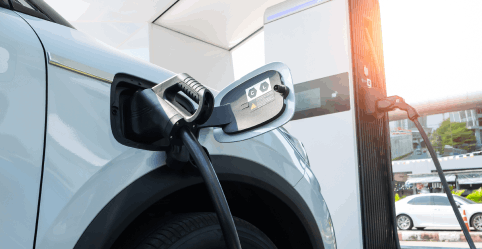ESG Impacts on the Auto Industry
Learn how ESG initiatives drive innovation in the auto industry, fostering sustainable growth and competitive advantage.

Cars are one of the primary contributors to greenhouse gas emissions. With increasing technological innovations and product offerings, automakers are now more than ever prioritizing environmental, social and governance (ESG) concerns to mitigate this impact.
Their efforts are especially significant considering the role that personal vehicles play in our daily lives, says Gustavo Bernal Torres, Vice President, ESG Integration at BMO Global Asset Management. “The auto sector has defined a way of life in the modern world,” he explains. “Our cities, currently, are built around cars.”
EV in numbers
Sustainability initiatives need to work around that reality, with a shift towards hybrid or electric vehicles (EV) leading the way. According to the International Energy Agency, the global count of electric cars reached over 26 million in 2022, a 60 percent increase from 2021 and more than five times where it stood in 2018.
By the end of 2022, nearly three out of every 20 cars sold globally were electric.
Bernal Torres notes that various markets, including China, Western Europe, Australia and parts of Southeast Asia have reached significant EV adoption milestones. North America’s transition however, in comparison, has been slower. According to Statistics Canada, close to 97 percent of all registered light-duty vehicles in 2022 were either motor gasoline or diesel-powered, with hybrid electric vehicles comprising 2% (494,000), and battery electric vehicles just 1% (over 225,000). Despite this, the Canadian numbers are growing and there is reason to believe they will continue to gain traction. An analysis by Bloomberg Green found that Canada might have recently surpassed the critial 5 percent threshold for new EV car sales - a number that effectively signifies that mass adoption is not far off. Even thought Canada and the U.S are still behind in this shift, they are still experiencing growth, as highlighted by Bernal Torres.
Behold the caveats
While some argue that electric vehicles (EVs) are not the panacea for ESG focused automakers, citing the carbon-intensive manufacturing of EV batteries, Bernal Torres contends that EV’s are more sustainable in the long run. Considering the average car lifespan of 10 to 12 years, an internal combustion engine’s continuous tailpipe emissions are significantly more than those of EVs over time.
“At the end of the day, the EV is not perfect but it’s better than the alternative in the long-term,” he explain. This is under the assumption that the EV is being charged on a grid using lower-emission sources than gasoline. “If the electricity is coming from a coal-powered plant the carbon accounting doesn’t quite add up.” Fortunately, in Ontario, the good news is the province uses mostly cleaner sources such as nuclear, hydro and wind energy, ensuring EVs are much cleaner in the long run.

Battery production
In alignment with the commitment to a cleaner economy, we’re witnessing an increase in EV battery manufacturing plants. At a recent kickoff event, Prime Minster Trudeau and Quebec Premier François Legault announced the building of a 170-hectare manufacturing facility in Montreal. The plant is expected to produce an annual battery cell manufacturing capacity of up to 60 gigawatt-hours annually – enough for about one million EVs each year.
With the first phase estimated to be completed by end of 2026, the initiative is just one of many government-funded projects designed to boost the EV industry in Canada. The federal and Ontario governments have also committed nearly $1 billion into an EV battery component plant in eastern Ontario.
An investment of over $640 million was also announced earlier in the year to build a new Ford EV plant in Bécancour, Que. Meanwhile, billions have been committed to keep the Stellantis-LG electric vehicle battery plant in Windsor and to subsidize the Volkswagen battery plant in St. Thomas.
Automakers are also exploring various other ESG strategies. Toyota for example, had been investing for years in hydrogen-powered vehicles, while also pioneering the hybrid Prius vehicle. Recently, the company announced it would be implementing solid-state batteries for full EVs – which have a different chemical composition than traditional lithium-ion batteries and could also prove more eco-friendly- through a partnership with Idemitsu Kosan to produce solid-state batteries for their electric vehicles starting in 2028.
But don’t expect the automaker to let go of their focus on hybrid cars anytime soon, says Bernal Torres. “They have been very conservative with their full EV roadmap; that’s been their strategy all along.”
ESG concerns are just one side of the story. These EV battery plant projects are expected to spur job creation as well as economic growth and resilience, marking significant victories in multiple sectors.
Climate policy
Should they need additional inspiration to enhance ESG efforts, Toyota and other automakers could look to the Inflation Reduction Act (IRA) in the U.S.. Signed into law in the summer of 2022, the IRA allocated US $400billion in federal funds toward reducing carbon emissions, among other commitments. Through tax incentives, grants and loan guarantees, the funds support initiatives like clean electricity and clean transportation, including EVs. “It’s building the incentive structure to move the auto industry forward,” says Bernal Torres.
The American policy has also had an impact on the Canadian automotive landscape, helping bring investments into Canada for companies aiming to benefit from the broader U.S.-Mexico-Canada Agreement (USMCA), previously known as NAFTA, along with compelling some businesses to move south of the border as well
Realizing that U.S. producers were gaining an advantage over their Canadian counterparts due to the IRA, the Canadian government has been trying to create its own incentives. Despite those efforts, Canada continues to lag in ESG-focused legislative and policy change. “Countries are now competing in terms of climate and industrial policies to drive investments. Canada has struggled to match the incentives from the U.S.,” Bernal Torres explains.
Moving forward
Discussions about the auto industry must include the recent strike by the United Auto Workers against the Big Three Detroit automakers. By its culmination, the workers walked away with new contracts granting workers at least 25 percent raise while enhancing retirement contributions and other benefits.
We have yet to see the impact of these wins on the labour force and automakers in the long-term. But, says Bernal Torres, every time a strike ends “companies get to return to business and production - and that’s a good thing.”
In terms of to sustainability, the auto industry seems committed to maintaining the momentum gained over the last few years. According to Ernst & Young Global Limited, between 2006 and 2021, emissions from car manufacturing in the EU fell by more than 45 percent, while the amount of CO2 that new cars emit has been cut by around 22 percent.
While the journey is far from over, Bernal Torres remains optimistic. “The reality is, consumers will choose with their wallets, and, so far, EVs are increasingly the most innovative and cost-efficient option.”
Why choose BMO for ESG investing?
Here’s how we’re helping you invest in a better tomorrow.


